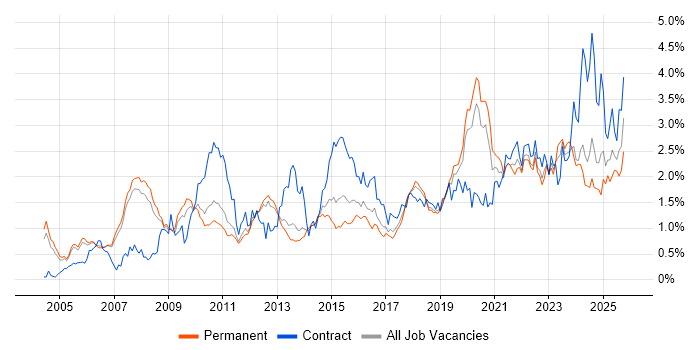Solution Architect
North West > Manchester
The median Solution Architect salary in Manchester is £73,500 per year, according to job vacancies posted during the 6 months leading to 25 February 2026.
The table below compares current salary benchmarking and summary statistics with the previous two years.
| 6 months to 25 Feb 2026 |
Same period 2025 | Same period 2024 | |
|---|---|---|---|
| Rank | 93 | 103 | 102 |
| Rank change year-on-year | +10 | -1 | +62 |
| Permanent jobs requiring a Solutions Architect | 53 | 42 | 80 |
| As % of all permanent jobs in Manchester | 1.47% | 1.75% | 2.17% |
| As % of the Job Titles category | 1.63% | 1.86% | 2.28% |
| Number of salaries quoted | 39 | 24 | 75 |
| 10th Percentile | £60,906 | £52,500 | £58,185 |
| 25th Percentile | £66,250 | £58,751 | £66,250 |
| Median annual salary (50th Percentile) | £73,500 | £68,500 | £70,576 |
| Median % change year-on-year | +7.30% | -2.94% | -8.93% |
| 75th Percentile | £82,500 | £87,500 | £85,625 |
| 90th Percentile | £89,000 | £109,750 | £92,500 |
| North West median annual salary | £73,250 | £60,000 | £70,576 |
| % change year-on-year | +22.08% | -14.98% | -5.90% |
All Permanent IT Job Roles
Manchester
For comparison with the information above, the following table provides summary statistics for all permanent IT job vacancies in Manchester. Most job vacancies include a discernible job title that can be normalized. As such, the figures in the second row provide an indication of the number of permanent jobs in our overall sample.
| Permanent vacancies in Manchester with a recognized job title | 3,243 | 2,262 | 3,502 |
| % of permanent jobs with a recognized job title | 89.88% | 94.09% | 94.96% |
| Number of salaries quoted | 2,190 | 1,179 | 2,914 |
| 10th Percentile | £30,000 | £35,650 | £29,010 |
| 25th Percentile | £40,000 | £42,500 | £41,250 |
| Median annual salary (50th Percentile) | £55,000 | £57,500 | £55,000 |
| Median % change year-on-year | -4.35% | +4.55% | -4.06% |
| 75th Percentile | £72,500 | £73,750 | £70,000 |
| 90th Percentile | £90,000 | £87,500 | £82,500 |
| North West median annual salary | £50,000 | £52,500 | £50,000 |
| % change year-on-year | -4.76% | +5.00% | -6.38% |
Solutions Architect
Job Vacancy Trend in Manchester
Historical trend showing the proportion of permanent IT job postings featuring 'Solutions Architect' in the job title relative to all permanent IT jobs advertised in Manchester.

Solutions Architect
Salary Trend in Manchester
Salary distribution trend for Solutions Architect job vacancies in Manchester.

Solutions Architect
Salary Histogram in Manchester
Salary distribution for jobs citing Solutions Architect in Manchester over the 6 months to 25 February 2026.
Solutions Architect
Job Locations in Manchester
The table below looks at the demand and provides a guide to the median salaries quoted in IT jobs citing Solutions Architect within the Manchester region over the 6 months to 25 February 2026. The 'Rank Change' column provides an indication of the change in demand within each location based on the same 6 month period last year.
| Location | Rank Change on Same Period Last Year |
Matching Permanent IT Job Ads |
Median Salary Past 6 Months |
Median Salary % Change on Same Period Last Year |
Live Jobs |
|---|---|---|---|---|---|
| Bolton | - | 2 | £82,500 | - | |
| Solutions Architect North West |
|||||
Solutions Architect Skill Set
Top 30 Co-Occurring Skills & Capabilities in Manchester
For the 6 months to 25 February 2026, Solutions Architect job roles required the following skills and capabilities in order of popularity. The figures indicate the absolute number of co-occurrences and as a proportion of all permanent job ads across the Manchester region featuring Solutions Architect in the job title.
|
|
Solutions Architect Skill Set
Co-Occurring Skills & Capabilities in Manchester by Category
The following tables expand on the one above by listing co-occurrences grouped by category. They cover the same employment type, locality and period, with up to 20 co-occurrences shown in each category:
